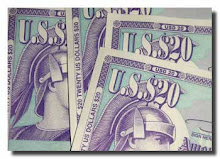LONDON (MarketWatch) -- Last week it was the euro; now it's the Japanese yen's turn to explore historic strength against the U.S. dollar.
The yen ended last week on a strong note, then extended gains in Asian and early European activity Monday to rally to its strongest level against the U.S. dollar in three years.
Foreign-exchange strategists linked the move mainly to renewed concerns about the U.S. economy and the prospect for further turmoil in the global financial sector.
The yen was 0.7% higher against the dollar at 102.99 yen in recent activity, after hitting 102.59 earlier in the session, according to data from FactSet. With the yen leading the way, the dollar was lower against most other major counterparts.
The dollar index, which measures the greenback against a trade-weighted basket of six major currencies, was quoted at 73.732 in recent action after dipping to its lowest level since the index was created in 1973.
Bouts of risk aversion have proven supportive to the yen in recent months as it leads traders to shun once-popular "carry trades." In a carry trade, a player borrows in a low-yielding currency, such as the yen or the Swiss franc, and then uses the funds to buy assets denominated in a higher-yielding currency.
Combined with underlying ideas the U.S. economy may already be in recession and expectations the U.S. Federal Reserve will continue aggressively cutting interest rates, the stage was set for further gains against the dollar by major currencies, analysts said.
Strong gains by the low-yielding Swiss franc indicated that risk aversion was the main theme of the day, said Roberto Mialich, a foreign-exchange strategist with UniCredit. The Swiss unit was trading near $1.0403 against the dollar, a gain of 0.1% on the day. Earlier, the dollar traded as low as $1.0305 against the Swiss franc.
Japanese stocks were hit hard as the yen rose. The stronger currency put pressure on Japanese exporters, analysts said. Tokyo's 225-issue Nikkei Stock Average dropped 3.6% to 13,114.30 and the broader Topix index sank 3.4% to 1,278.84. See full story.
Meanwhile, Japanese officials gave no indication of concern about the yen's gains -- a factor that further encouraged the currency's rally, Mialich said. If traders begin to perceive an attitude of "benign neglect" toward a stronger yen by Japanese officials, the currency could soon make a test of the 100-yen level against the dollar, he said.
The euro, which last week marched to record territory against the greenback, was slightly higher against the U.S. unit at $1.5166. The European single currency was 0.7% lower against the surging Japanese currency at 156.14 yen, and was holding a gain of around 0.2% against sterling at 0.7640 British pounds.
The pound, meanwhile, was on the defensive against the greenback, losing 0.2% to $1.9849.
The European Central Bank and the Bank of England both hold policy meetings Thursday. Both are expected to keep interest rates on hold for this month.
Stronger-than-expected European economic data, including last week's unexpected rise in Germany's Ifo index of business sentiment, have contributed to expectations the ECB will leave its key lending rate on hold, analysts said. More global coverage.
A preliminary estimate of consumer price inflation across the 15 nations that make up the euro-zone was in line with market expectations for a 3.2% rise in February, according to data released by European Union statistical agency Eurostat. That matched the record pace seen in January and remains well above the ECB's medium-term target of under 2%.
Bank of England policymakers, meanwhile, have acknowledged risks of an economic slowdown. But they've also emphasized near-term concerns about inflation, focusing on its potential impact on consumers' longer-term inflation expectations. The bank's Monetary Policy Committee is expected to leave its key rate on hold at 5.25% after cutting by a quarter-point in February.
"Markedly faltering U.K. growth and the very real risk of a sharp economic downturn mean that further interest rate cuts are clearly on the Bank of England's agenda," wrote Howard Archer, chief U.K. and European economist at Global Insight. "Nevertheless, [Thursday's] meeting of the Monetary Policy Committee is highly likely to prove too soon to yield the next 25-basis-point interest rate cut to 5.00% given current elevated inflationary pressures."
Meanwhile, the U.K. CIPS purchasing managers index for manufacturing posted a stronger-than-expected rise to 51.3 in February, up from 50.7 in January, news reports said. Market expectations were for a reading of 51.0.
Analysts said PMI data for the services sector due for release on Wednesday could have an impact on U.K. rate expectations.
"Sterling faces another volatile week, with the services PMI survey on Wednesday likely to trigger a very ... jittery 24 hours ahead of the BOE verdict on Thursday," wrote analysts at Lloyds TSB. "A sharp drop for the PMI and wider [spreads between the London interbank overnight rate, or Libor, and the central bank's base rate] could spark sterling selling," potentially pushing the euro to another round of new highs against the pound.

